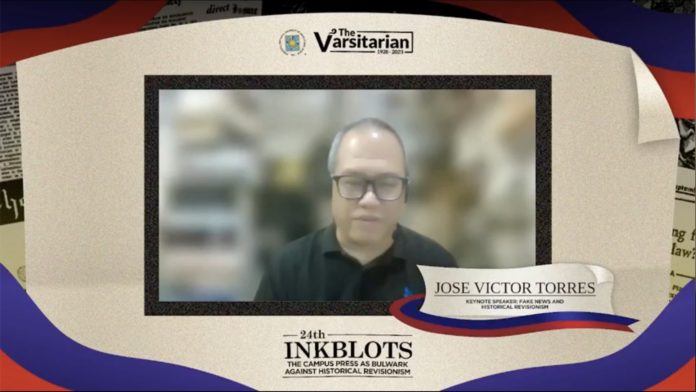THE PRESS has the responsibility to guard against historical distortions based on largely false narratives, a Thomasian historian told a national conference of campus journalists last week.
“To fight historical distortion, we simply show the truth, which is the function and the task of every writer of the news or journalist here in the country,” said Assoc. Prof. Jose Victor Torres in his keynote speech during the 24th Inkblots on Saturday, Feb. 18.
Torres said journalists must study Philippine history and learn the facts to be able to provide accurate context and disseminate the truth.
He warned that history, in the wrong hands, could become a weapon for corrupted education.
“If you cannot get your facts straight, don’t write the news. Same thing with history. If you cannot get your facts straight, do not write it at all,” said Torres, who taught history at UST and is now a faculty member of De La Salle University history department.
Revisionism versus distortion
In his lecture, Torres distinguished historical revisionism from historical distortion.
Torres explained that historical revisionism was normal as “the emergence of theories, interpretations, and even facts” could change and update history.
“Nothing is wrong with historical revisionism as long as it is properly applied because [historical revisionism] is by itself a properly done scholarship. History is not something that is fixed,” the historian said.
Historical distortion is lying or painting facts based on false evidence for personal gain, Torres said.
This is equivalent to “fake news,” which he said made the work of journalists harder.
Historical distortion helped Ferdinand Marcos Jr. achieve his landslide win in the 2022 presidential election, the professor said, saying the president painted Martial Law under his father and late dictator Ferdinand Marcos Sr. as an era of prosperity in the Philippines despite widespread poverty and well-recorded cases of human rights violations.
“He won on the belief that what happened during his father’s administration was something good, and many Filipinos now believe that he would bring back the so-called ‘Golden Age,’” Torres said.
The 24th installment of Inkblots, the Varsitarian’s annual campus journalism fellowship, had the theme “The Campus Press as Bulwark Against Historical Revisionism.” It was conducted virtually for the third straight year due to the Covid-19 pandemic.
The webinar featured talks from GMA Integrated News senior social media manager Aileen Rae Perez, PhilStar.com editorial head Camille Diola, and “Facts First” host and UST journalism professor Christian Esguerra.
Rappler reporter Lian Buan moderated the live roundtable discussion.












